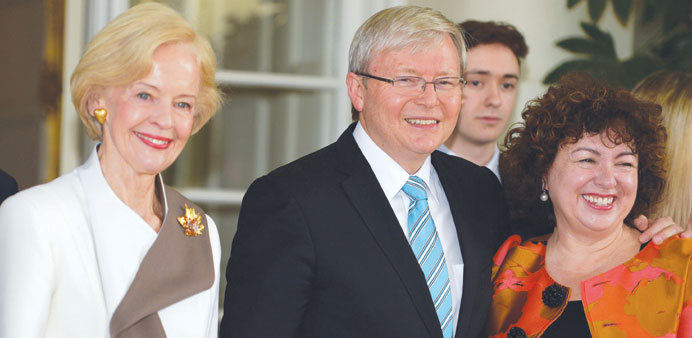Australian Governor-General Quentin Bryce (left) stands alongside Kevin Rudd and his wife Therese Rein after he was sworn-in as Australia’s new prime minister at Government House in Canberra.
Reuters/Canberra
Kevin Rudd was sworn in as Australian prime minister for the second time yesterday, a day after toppling Julia Gillard and three months ahead of elections in which opinion polls show the ruling Labor Party faces a devastating defeat.
Rudd’s return as prime minister follows three years of squabbling within the Labor leadership and as the world’s 12th largest economy faces challenges stemming from a slowdown in top trade partner China.
Rudd has highlighted the difficulties associated with “the end of China’s resource boom” and said he would work to rebuild the government’s strained relations with the business community.
He left open the option of changing the September 14 election date, telling parliament that prime ministers had the right to choose the date. “There is not going to be a huge variation one way or the other,” he said.
The favourite to win the coming elections, opposition leader Tony Abbott, has promised to scrap a carbon tax and a 30% tax on iron ore and coal mine profits if he wins power. He has also promised tighter control of public spending, a speedier return to surplus budgets and stronger economic growth.
Rudd’s first task will be a major cabinet reshuffle after a string of senior ministers loyal to Gillard resigned, including former deputy prime minister and treasurer Wayne Swan, Trade Minister Craig Emerson and Climate Change Minister Greg Combet.
Former immigration minister Chris Bowen was sworn in as Treasurer and Transport Minister Anthony Albanese was sworn in yesterday as deputy leader.
Voters welcomed back Rudd, always among the most popular of politicians. “I am glad that we’ve now been given the opportunity to have the prime minister we voted in several years ago,” said Peter Mayson, who works in the building industry in Sydney.
Rudd, who was prime minister from late 2007 until 2010, said thoughts of the good of the nation had spurred him to abandon a promise this year never to run for office again, following a failed bid to unseat Gillard.
Opinion polls had shown Gillard’s minority government could lose up to 35 seats, giving the conservative opposition a massive majority in the 150-member parliament.
Gillard, his former deputy, who ousted him in 2010 and led a minority government, then fought off two attempts by Rudd to reclaim the leadership, said she was quitting politics at the next election after losing the party ballot.
“Political life is a very hard life, a very hard life indeed,” Rudd said, asking fellow lawmakers to be a little “kinder and gentler” with each other.
Analysts said the dramatic leadership change should help lift Labor’s standing in opinion polls, although the initial boost might not last until the elections and Labor was still likely to lose power.

